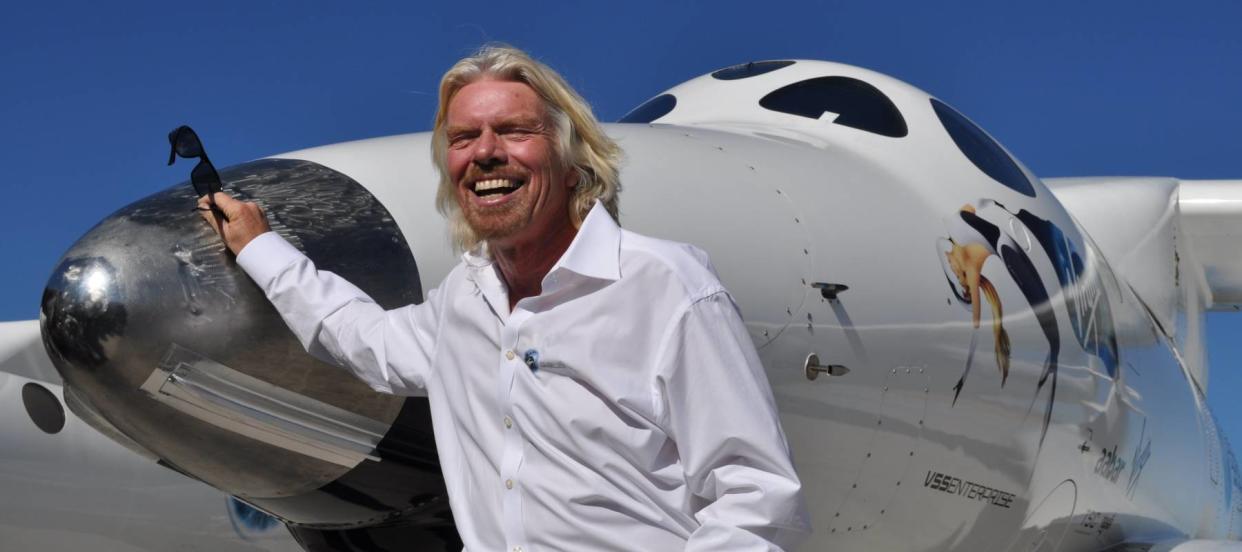‘The best always succeeds’: How Richard Branson went from running a student magazine to managing a $3B global empire

As a teenager, Richard Branson wanted to be an editor or a journalist — but his sense of adventure and drive for business helped him transform into the billionaire business magnate he is today.
Branson is best known as the co-founder of the Virgin Group, which owns a massive portfolio of businesses, including in hotels, radio stations, airlines and even commercial space flight. In a 2022 interview on The Diary of a CEO with Steven Bartlett, Branson chats about his past and how he went from a struggling student who dropped out of school to a successful self-made billionaire.
Don’t miss
Commercial real estate has topped the stock market for over 25 years — but only the elite had access. Now you can super-spike your wealth even if you're just an everyday investor
Inflation is still white-hot in 2024 — use these 3 'real assets’ to protect your wealth today, no matter what the US Fed does or says
Anything can happen in 2024. Try these 5 easy money hacks to help you make and save thousands of dollars in the new year (they will only take seconds)
Whether it comes down to building a hotel that’s gone over budget or launching a new cruise line during COVID-19, the British business magnate attests, “the best always succeeds.”
Here are three important lessons you can learn from his story.
Turning a learning challenge into a superpower
Branson went off to boarding school at the age of seven, but struggled with dyslexia, which he wasn’t officially diagnosed with until his twenties.
“I had no idea what dyslexia was, I just assumed that I must be a little bit thick,” Branson says, explaining he struggled with subjects like algebra and Latin — in part, because he wasn’t interested in learning them.
However, in recent years, Branson has compared his dyslexia to a superpower. He describes himself as inquisitive and interested in learning new things, especially things that he feels other people aren’t doing so well in.
It’s this mindset that has helped him hone in on the skills and projects he’s passionate about and delegate tasks that he doesn’t excel at to other people. Being self-aware of your strengths and weaknesses — and other people’s — is crucial when you’re running your own business or managing employees.
Read more: A Pennsylvania trio bought a $100K abandoned school and turned it into a 31-unit apartment — but here's a much simpler way to earn real estate riches without a mountain of red tape
Nurturing his entrepreneurial spirit
In his sit-down interview, Branson talks about his mother, Eve, who he describes as one of the first — although “not particularly successful” — entrepreneurs he learned from. He recounts his mother making table mats and repurposing pictures from books that she’d sell at department stores like Harrods or Harvel Nichols.
Branson credits his mother for instilling a sense of perseverance and adventure in him, to keep moving forward and pushing onto new and bigger things.
Branson actually dropped out of school at 15 and launched his first business with less than $2,000 after being handed an ultimatum from his headmaster to either focus on his formal education or continue running the student magazine. He worked from a dingy basement room and sometimes even in a tiny phone box to ring up advertisers, but threw himself into the project and considered it his new education.
Branson didn’t finish high school let alone go to college, but he did build his skills and gain valuable experiences by being willing to take risks and forge his own path. It can be hard to take a similar leap of faith — whether you’re starting your own business, pursuing a different career or investing in something new — but like Branson, you have the potential to reap large rewards in the future.
Choosing to diversify
While many entrepreneurs focus solely on a single project and pour all of their energy into that, Branson emphasizes the importance of changing, growing and adapting to different businesses as a way to succeed. His portfolio of businesses includes Virgin Atlantic, Virgin Hotels, Virgin Radio, Virgin Mobile and many more.
He shares the example of a record store — one of his first businesses — explaining that if he had stuck with that alone, instead of tapping into other ventures, he would be out of business today because those stores no longer exist.
But, perhaps equally important, diversification also keeps things exciting.
Branson espouses the golden rule of investing — don’t put all your eggs into one basket. It’s important to diversify your portfolio and invest in different stocks and assets. This way, if one sector takes a major loss, it won’t wipe out the rest of your investment holdings.
What to read next
Robert Kiyosaki warns 401(k)s and IRAs will be 'toast' after the 'biggest crash in history' — protect yourself now with these shockproof assets
Jeff Bezos and Oprah Winfrey invest millions in this rare asset to keep their riches safe — How to ride their coattails even if you're not super rich
Millions of Americans drowning in debt as interest rates climb — use this free tool today to pay off your credit card fast and save thousands in interest
This article provides information only and should not be construed as advice. It is provided without warranty of any kind.
